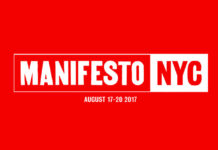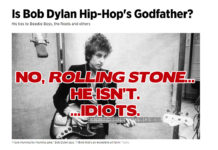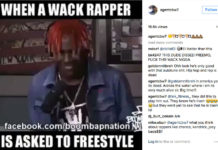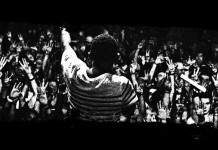All Stars Hip-Hop Cabaret is an ongoing program of the All Stars Project, Inc., a multi-disciplinary, youth-oriented, not-for-profit theater arts group, overseen by artistic director Dan Friedman, Ph.D. The 40-year theatrical veteran co-directs the Cabaret with Antoine “RL” Joyce, himself an alum of the All Stars program.
The show fuses traditional European political cabaret with the cutting, forceful mouthpiece that hip hop is renowned to have. As dean of its free theater training program, Dr. Friedman, along with Joyce, developed this outlet for young performers to creatively express themselves, providing them a canvas to emote their viewpoints on socioeconomic conditions affecting their daily lives.
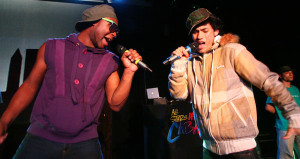
Inside the All Stars Project, such a show is conceived through a series of “rap sessions”, discussions and debates that morph into an improvisation of potential solutions. With the application of individual talents and skills, this dialog transforms into onstage dramatic and musical acts. While hip hop is the aesthetic, the framework of Hip-Hop Cabaret is a cultivation of a tapestry of original ideas. It is theatrical development led by a meeting of minds where kids and teens are being trained to process and project their lives onto the stage.
The path of Hip-Hop Caberet’s inception began in early 1983. Hip hop was still in the early phases of achieving global influence when the Castillo Theater was created. Described as “a showplace for the plays of Fred Newman and Heiner Müller, a multicultural home for Black theater, and a hotbed of theatrical improvisation,” the theater was performing a plethora of avant-garde, politically oriented plays but also experimenting with workshops and projects using hip hop to carve out a niche for effective use. Located first on East 20th St. before moving to Greenwich St. in Soho in 1989, the Castillo Theater took a leap of faith in 2003 to expand to its current 42nd St. locale, a 31,000 square foot now called The All Stars Project Performing Arts and Learning Center, where the use of hip hop has added a new dimension to the All Stars Project.
Dr. Friedman, one of Castillo Theater’s founders and its artistic director, has served as dramaturg since 1989. He’s the dean of its free theater training program, and oversees the Youth Onstage and Becoming Producers programs. Once the Castillo Theater reached 42nd Street, the All Stars Project was able to spread its wings to develop the Hip-Hop Cabaret, pulling talent and ideas from Youth Onstage and a host of other internal programs. Originally a self made, non-profit, non-partisan organization dedicated to the use of an innovative performance model that fosters human development, the All Stars Project regularly produces shows throughout the city featuring its Youth Onstage theater group. Other programs under the All Stars umbrella include All Stars Talent Show Network, Development School for Youth, Becoming Producers, Operation Conversation: Cops and Kids and Hip-Hop Cabaret Workshops.
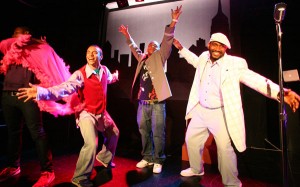
Hip-Hop Cabaret commenced in 2004, a product of the collective programs with a mission aimed at developing youth, not necessarily for stardom, but to be stars in their own lives as they become world class citizens. The cast is made up of kids from different inner city communities from various reaches of the tri-state area. They come to audition and participate in the talent shows, as part of the All Stars Talent Show Network, which produces talent shows in neighborhoods all over New York City and Newark, as well as chapters in Chicago and the Bay area of San Francisco. From there, they can evolve into the Youth Onstage program and begin to explore theater as a mainstay discipline in their lives.
From that point, a handful of students are coalesced into the Hip-Hop Cabaret where they explore certain themes posed to them, as well as ideas culled from their own experiences. “This year the themes we are going to address are teen motherhood and hip hop as an art versus hip hop just for money. This led to a conversation on poverty, which rounds out a key issue for inner city kids,” informs Joyce.
The All Stars alum laid out a process as to how the show is built. In a “rap session,” an informal round-table dialog of ideas, a debate has sprung up, one side arguing that selling drugs may be justifiable if it means supporting your family and surviving. Of course, the counter argument is presented and then cemented by the very environment they’re expressing their viewpoints in as Dr. Freidman and RL challenge them to make their case in a song, a dance, a rap or a scene. Dr. Friedman says, “The Hip Hop Cabaret displays a ‘little p’ for politics because the show provides commentary on the situations the young artists are living day to day.”
Joyce goes on to explain that “the cabaret style of theater was traditionally an outlet for introducing politics in the 1920s and 30s in Europe. Hip hop is also political in it expression about poverty, violence, and racism in urban life.” Bringing these two compatible concepts together provides a natural platform for youth to think critically in terms of what they want to say to the world. It also gives them the opportunity to professionalize their work while authenticating their cultural expression.
Antoine “RL” Joyce has a special connection to the All Stars Project because he is one of the success stories to emerge out of the youth programs. “RL,” an affectionately shortened version of “Ring Leader,” serves daily as a development officer (aka “Diddy of Development”) for the theater. He has been with the All Stars since he was 13 years old. After graduating from the program, the native Brooklynite entered the music business professionally, fulfilling A&R duties for the legendary Grandmaster Flash, working with the hip hop pioneer on his 2009 album The Bridge – The Concept of a Culture, as well as overseeing shows as his tour manager from 2005 to 2008.
After experiencing first-hand the glamor and wealth that commercial hip hop could generate, he began to encounter kids from all over the world who knew the lyrics to rap songs, even ones he helped produce. RL was inspired by their passion for the genre but he couldn’t reconcile how hip hop could take you all over the world, “baller-style,” dispensing power and wealth, while poverty in the inner city continued to rule with a choke hold on communities of color and in low income environments. He decided to come back to the All Stars Project and direct his efforts toward urban kids so they, in turn, could go and do the same in their own neighborhoods. To him, that positive change was the true potential of hip hop.
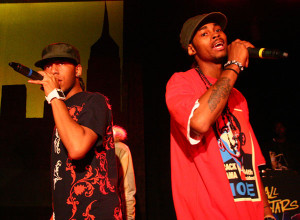
Dr. Friedman echoes this point, stating, “The All Stars is ultimately about fighting poverty.” Part of how this is done revolves around programs and procedures in place to artistically answer any need or situation that presents itself and the insistence on moral and professional requirements. Socially ill products of the ghetto environment confront structure at All Stars. Any loosely clad female or sagging pants-wearing male quickly learns that there is a dress code for certain aspects of the world, but also discovers a venue still exists where they can sag and let loose. That venue is on stage, in character, and for some, it becomes more intoxicating than the glamorized street life the performers leave behind.
Lessons abound as All Star youths learn the protocol of accountability by signing in upon arrival and being on time. As a development venue, kids learn all the basic elements of theater culture, such as the meaning of “blocking” upstage or downstage, as well as the importance of dress and technical rehearsals, maintaining costumes and having dressing rooms.
The kids and teens become fully vested after committing themselves and experiencing the power of building a show that has evolved from their own lives. The Hip-Hop Cabaret becomes a platform that can be heard by the world, so the project empowers them to go out and attempt to make a difference, to be focused on and pursuant of their dreams. In between shows they are exposed to master classes with leaders in the field, such as Grammy Award winning songwriter Julie Gold and Talu Green, featured drummer from the Tony nominated show Fela. When the likes of world famous dancer and choreographer Javier Dzul can be found teaching a master class on movement, it is no wonder these kids achieve an understanding that it is possible to make a living in the performing arts, or in fact, excel at anything they set their minds to.
Too modest to boast of its noteworthy alumni such as Mekhi Phifer and Lil’ Mama, the All Stars Project is unique in that it is a theater project and performing arts school that doesn’t look for talent, but rather, seeks to cultivate potential. The theater training program is more of a blueprint for kids to learn the skills of life, whether they pursue performing arts or a career in the corporate or non-profit sector. Evidence of this mantra is the Community Performance School, under the All Stars program, in which a curriculum exists that teaches high school students to write resumes, dress for success and acquire internships in the corporate world.
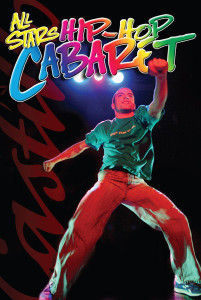 In all, the All Stars Hip-Hop Cabaret provides a talent-filled, empowering demonstration of how politically and socially astute kids and teens can become if given the opportunity to utilize their voices to express themselves to the rest of the world. It’s an impactful show, but the type of performance that truly needs to be experienced. It is that experience, about the youth and created by the youth, but designed for the world, that serves as an invitation to effect change, as these performers have changed themselves, as well as the very platform on which they perform.
In all, the All Stars Hip-Hop Cabaret provides a talent-filled, empowering demonstration of how politically and socially astute kids and teens can become if given the opportunity to utilize their voices to express themselves to the rest of the world. It’s an impactful show, but the type of performance that truly needs to be experienced. It is that experience, about the youth and created by the youth, but designed for the world, that serves as an invitation to effect change, as these performers have changed themselves, as well as the very platform on which they perform.
Programs include:
Youth Onstage!, a free after-school theatre training program for young people, aged 14 to 21.
The Development School for Youth, a leadership-training program for young people between the ages of 16 and 21 that focuses on development.
The All Stars Talent Show Network, an after school, performance-based enrichment program for inner- city youth, ages 5-25 and adult volunteers.
Becoming Producers, a free after school program for young people, ages 16 to 21, who want to explore what it means to be a cultural producer.
Operation Conversation: Cops and Kids is a series of dialogues and performance based workshops helping police and inner-city youth improve and develop their relationship.
The Castillo Theatre produces multicultureal and avant-garde plays, musical theatre and performance projects that deal with social issues.
The All Stars Project’s performing arts and development center is located at 543 West 42nd Street between 10th and 11th Avenues. For more information call 212-941-9400 or go to www.allstars.org.
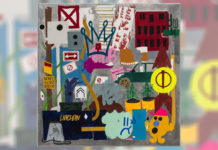
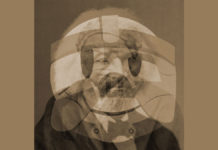
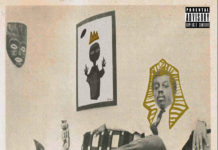
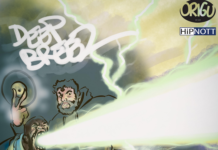

![The Underachievers – Crescendo [VIDEO]](https://www.birthplacemag.com/wp-content/uploads/2017/08/hqdefault-2-218x150.jpg)


![Fat Joe & Remy Ma ft. The-Dream – Heartbreak [VIDEO] Fat Joe Remy Ma The Dream - Heartbreak Video](https://www.birthplacemag.com/wp-content/uploads/2017/05/fat-joe-remy-ma-218x150.jpg)
![JSWISS featuring Chandanie – LML [VIDEO] JSWISS featuring Chandanie - LML [VIDEO]](https://www.birthplacemag.com/wp-content/uploads/2017/05/JSWISS-218x150.jpg)

![Akinyemi Ends Summer With “Summers” EP Release Show [9-17-17] Akinyemi 'Summers' EP release show at Brooklyn Bazaar](https://www.birthplacemag.com/wp-content/uploads/2017/09/summers-featured-218x150.jpg)
![4th Annual NYC VS EVERYBODY Yacht Party [9/16/17] #VSYacht 4th annual NYC VS Everybody Yacht Party#VSYacht](https://www.birthplacemag.com/wp-content/uploads/2017/09/vsyacht-218x150.jpg)
